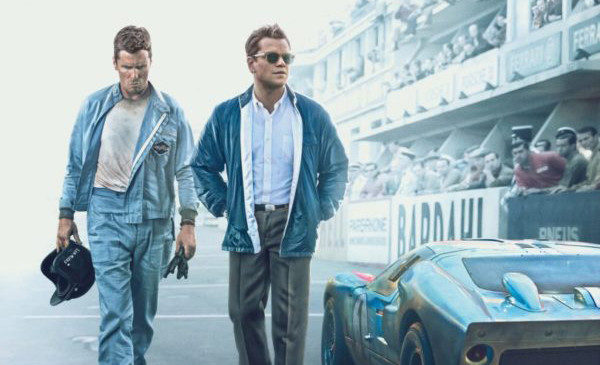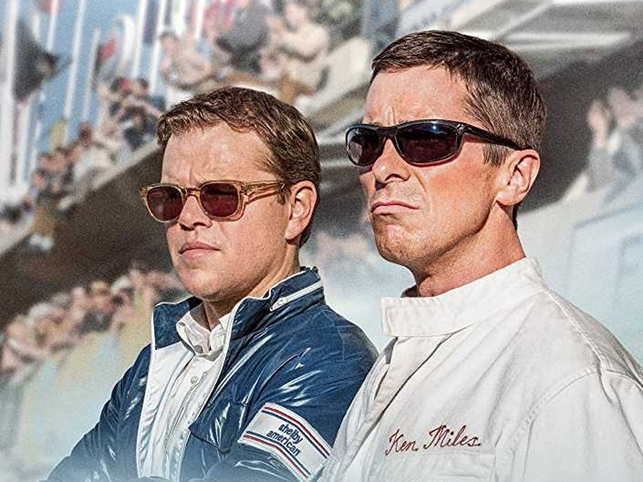Ford v. Ferrari (2019)

DIRECTOR: James Mangold
CAST: Matt Damon, Christian Bale, Jon Bernthal, Tracy Letts, Josh Lucas, Caitriona Balfe, Noah Jupe, Ray McKinnon
REVIEW:
Ford v. Ferrari, director James Mangold’s (Walk the Line, Logan) docudrama chronicling events leading up and involving the 1965 and 1966 Le Mans, is likely to appeal to the same audience that appreciate Rush, Ron Howard’s similarly-themed docudrama. The key difference is that the central dynamic here, rather than the “frenemies” there, is in full-blown “buddy movie” mode—albeit not without a little tension—but both movies do an effective job of balancing visceral racing sequences with strong human drama.
Ford v. Ferrari tells the true story (albeit with a little dramatization) of how Henry Ford II (Tracy Letts) ended up in a racing rivalry with Enzo Ferrari (Remo Girone) that culminated in showdowns at the 1965 and 1966 Le Mans, but the protagonists of our story are named neither Ford nor Ferrari. Former race car driver turned car salesman Carroll Shelby (Matt Damon), his racing glory days put behind him by a heart condition, is approached by Ford executives Lee Iacocca (Jon Bernthal) and Leo Beebe (Josh Lucas) to help Ford come up with a race car good enough to compete with perennial Le Mans winner Ferrari, and a driver good enough to handle it. For the latter, Shelby turns to his old friend, British racer Ken Miles (Christian Bale). But Miles is “difficult” and soon earns the enmity of Beebe, forcing Shelby to fight back against Beebe’s attempts to take over the operation and cut Miles out, while Miles fights to get Ford a win on the race track.
Car racing is not an inherently cinematic sport, but Mangold does perhaps the best job of filming the racing sequences of any movie in recent memory, surpassing Ron Howard’s direction in Rush and bringing us perhaps as close as any movie can come to a visceral “you are there” experience, cutting between interior through-the-dashboard POV and wide shots to both give a sense of immediacy and keep the action understandable. When traveling in excess of 200 mph, in close proximity to other race cars, the smallest slip-up can spell disaster, and the courses are unforgiving, especially in rainy weather or in nighttime darkness, both of which are experienced during the climactic Le Mans. When cars spin out of control, collide, crash, and explode, Mangold gives it a jarring visceral impact. Period details are impeccable, Phedon Papamichael’s cinematography is crisp and sharp, and the movie delves into the nuts and bolts of designing and building the cars. Like the strongest sports movies, there’s plenty of drama off the track (often more so). There’s plenty of back-and-forth maneuvering in the lead-up to the racing competition. Initially, Ford is not impressed with Iacocca’s sales pitch of getting into the racing business—Ferrari had been the perennial Le Mans winner for years—but after Iacocca also makes his pitch to Ferrari himself, Ferrari’s scathingly insulting dismissal bruises Ford’s ego, and suddenly defeating Ferrari is a top priority (leaving one wondering if all of this unfolded exactly the way the shrewd Iacocca intended). In fact, the closest we have to a “villain” isn’t the seldom-seen Ferrari or Miles’ racing arch rival Lorenzo Bandini (Francesco Bauco), neither of whom gets much screentime, but Josh Lucas’ meddling, obstructionist corporate executive Beebe, and the significant subplots involving elements of out-of-touch corporate greed versus “pure” racers like Miles, and the “buddy movie” angle, make Ford v. Ferrari a little more than “just” a sports movie. The movie also isn’t without its laughs, most prominently in a scene where the tough-talking Ford is reduced to blubbering tears after riding shotgun in a race car with Shelby, and another bit where Shelby and Miles engage in a fistfight while Miles’ unconcerned wife (Caitriona Balfe) pulls up a lawn chair to watch. There’s also an amusing bit where Shelby outmaneuvers the meddling Beebe to go over his head and make his sales pitch directly to Ford himself by literally locking an infuriated Beebe in his office.

Matt Damon and Christian Bale mesh well enough for the “buddy movie” element to be effective; the two men, while sharing a maverick streak, are oil and vinegar, with Shelby laid-back and easygoing and Miles intense and abrasive; Miles is not a “people person”, and his curmudgeonly behavior and undiplomatic tongue sometimes sends the smooth-talking Shelby scrambling to do damage control. Damon is fine, using his easy charm to hold his own as essentially the “straight man”, but Bale gets the juicy, colorful part, and sinks his teeth into it with relish as the irascible-but-brilliant Miles, who is as difficult off the track as he is peerless on it. Newly gaunt following his Oscar-nominated transformation into Dick Cheney in last year’s Vice (the two roles could hardly be further apart, either physically or in any other way), Bale has added another distinctive character to his filmography and reaffirmed his credentials as one of the strongest character actors in his age range. This is Bale and Damon’s show first and foremost, but strong performances abound in the supporting cast, including Tracy Letts in a not particularly flattering portrayal of Henry Ford II, who often comes across like an out-of-touch and egotistical blowhard (his best bit is the aforementioned sobbing meltdown), Caitrionia Balfe as Miles’ supportive but no-nonsense wife, and Noah Jupe (the son in last year’s horror thriller A Quiet Place) as Miles’ idolizing son. Both of the latter two parts are a little better-developed than expected; Balfe’s role gets to have a little more substance than just the standard-issue thankless bit of the supportive/worried wife in these kinds of movies, and the movie takes the time to give the father-son relationship a little depth, with most of the abrasive Miles’ flickers of a softer side coming through in these moments. Alas, the same depth is not accorded to Josh Lucas, who doesn’t get much to do besides ooze smarm. We’ve seen this character in any number of other movies, a standard-issue one-dimensional corporate asshole who seems to exist for the sole purpose of being a meddling nuisance. There was a real Ford executive named Leo Beebe, but some who knew him have complained that the version of him which appears onscreen is mostly fictionalized and unfairly maligned to provide an obligatory “villain”. Jon Bernthal gets to play against his usual thuggish type, playing Lee Iacocca (who would later become a household name by reviving Chrysler’s fortunes in the 1980s) as a savvy, slick-talking executive, although his importance to the story fades as the movie goes along; he has a major role in getting the ball rolling, then mostly fades into the background by the time we get to the races. Smaller roles include Ray McKinnon as a trusty friend of Shelby and Miles, and Remo Girone as the Godfather-esque Enzo Ferrari.
While Ford v. Ferrari imbues some elements with a little more depth than expected in standard-issue sports movies, and broadens its themes beyond the racing competition or the buddy movie dynamic, it doesn’t abandon the tropes fans come to see. We still get the training montages building up to the big contest, we get our mismatched dynamic duo teaming up to persevere, and we get the big showdown, but the way the climax wraps up is a little unconventional, and while there’s moments of adrenaline-pumping triumph that sports movie fans expect, the epilogue ends things on a bittersweet note (one mandated by the true story). But, while slightly overlong (the two and a half hours start to be felt by the climax), Ford v. Ferrari is a strong, solid entry in the sports drama, featuring racing sequences good enough to satisfy fans of the sport while also featuring enough human interest that it can appeal to racing neophytes, buoyed by Mangold’s slick direction and strong lead performances by Matt Damon and especially Christian Bale. In a movie landscape that feels ever more oversaturated with instantly forgettable titles, it’s a little refreshing to come across a worthy and satisfying entry in its genre.
* * *